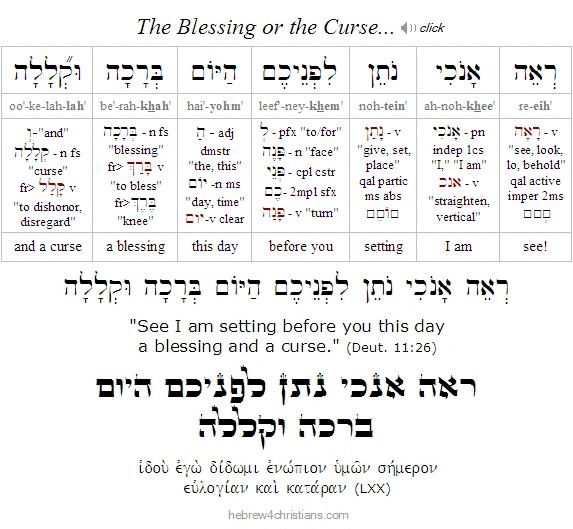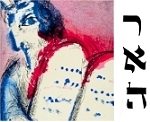|
|
|||||||||||||||||||||
 |
|||||||||||||||||||||
 |
|||||||||||||||||||||
|
|
||||||||||||||||||||||||||||||||||||
|
|
|
||||||||||||||||
 |
|
The doctrine that man has free will (i.e., bechirah chofshit: בְּחִירָה חָפשִׁית) is considered a fundamental principle and axiom in Jewish moral reasoning, at least according to some of the Jewish sages. For example, Rabbi Akiva is reported to have said: "Though everything is foreseen by God, yet free will is granted to man" (Avot 3:19). |
|
The Concept of Arevut |
|
Notice that the keyword re'eh is singular (you see!), whereas the pronoun lifneikhem (before you) is plural. Each person is to personally see that the blessing and the curse will affect the entire community of Israel. This value is called arevut (עֲרֵבוּת), "mutual responsibility," and the idea of caring for the welfare of one's fellow Jew is expressed in the phrase kol Yisrael arevim zeh bazeh (כָּל יִשְׂרָאֵל עָרֵבִים זֶה בַּזֶה), "all Israel is responsible for one another." This is a foundational value in Judaism - to preserve and protect the Jewish community and to help each person maintain their Jewish identity and responsibility to one another. It involves the idea of offering tochechah (correction) to fellow Jews to help them live in personal righteousness (Lev. 19:17): "You must surely admonish your neighbor and [thus] not bear sin because of him." |
|
The Appointed Place |
||||||||||||||||
|
Because idolatrous practices were so common in Eretz Canaan (including the sacrifice of children to false gods), the people were commanded to destroy all objects related to avodah zarah (idolatry). They were not to serve the LORD in a manner that even vaguely resembled the abominable customs of the seven Canaanite nations with their altars upon hilltops and under trees. Instead, the Jews were commanded to "seek the place that the LORD your God will choose out of all your tribes to put his Name and make His habitation there." Sacrifices were to be offered at the LORD's chosen place -- and no other. |
||||||||||||||||
|
Ritual Slaughtering |
||||||||||||||||
|
The (non-sacrificial) slaughtering of a kosher animal was permitted for food, so long as the animal was properly prepared (by a shochet) and all its blood was removed (i.e., poured out, with the meat salted and later washed to remove any residue). An animal that was not properly slaughtered (according to shechitah) is called neveilah and may not be eaten. |
||||||||||||||||
|
The Giving of Tithes |
||||||||||||||||
|
Three types of tithes are mentioned in this portion of Torah:
|
||||||||||||||||
|
Navi Sheker - the false prophet |
||||||||||||||||
|
If a prophet (navi) or dreamer of dreams (choleim chalom) arises that performs "signs and wonders" and entices you to follow other gods, you are not to take heed to his or her words, but understand that the LORD is testing you to see if you love Him with all your heart and soul. We can discern if a prophet is false by testing them: If they claim a god (idol) spoke to them, then they are lying, since only the LORD is God and other so-called gods are impostors (i.e., demons). Another test is to see whether they abide by the mitzvot given by Moses. A true prophet would not add or take away from his message. |
||||||||||||||||
|
Shemittah - the Sabbatical Year |
||||||||||||||||
|
Every seventh year is a shemittah - a time of rest for the land. In addition, Moses added that the seventh year should mark a time of shemitat kesafim - the canceling of debts owed to one's fellow Jew: |
||||||||||||||||
|
"At the end of every seven years you shall grant a release (shemittah). And this is the manner of the release (shemittah): every creditor shall release (shamot) what he has lent to his neighbor. He shall not exact it of his neighbor, his brother, because the LORD'S release (shemittah l'Adonai) has been proclaimed. Of a foreigner you may exact it, but whatever of yours is with your brother your hand shall release (tashmeit yadekha). But there will be no poor among you; for the LORD will bless you in the land that the LORD your God is giving you for an inheritance to possess. (Deut 15:1-4)." |
||||||||||||||||
|
After a Shemittah year has passed, a Jew who lent money to another may no longer ask for repayment (this did not apply to loans made to foreigners). Moses further warned the people not to begrudge their giving to the needy brother because the Shemittah year was near. No - they were commanded to be generous and willingly help the poor among them. Doing so yields a promise: "for this the LORD your God will bless you in all your work and in all that you undertake" (Deut 15:10). Indeed, if the Israelites were obedient to the commandments the LORD promised them such an abundance that there will be no poor people living in the land! |
||||||||||||||||
|
Indentured Servitude |
||||||||||||||||
|
If an Israelite stole money and could not repay it, he or she was to be sold as a slave for six years of indentured servitude (the money of the sale paid for the theft). In the seventh year, however, he was to be set free. |
||||||||||||||||
|
Firstborn Males (bechorim) |
||||||||||||||||
|
All the firstborn males of the herd or flock shall be dedicated to the LORD. They shall not be "worked" or put to profane use, but only sacrificed and eaten before the LORD at the appointed place. However, if the firstborn has any blemish (mum), it shall not be sacrificed, though it may be ritually slaughtered and eaten as other kosher meat. |
||||||||||||||||
|
Shelosh Regalim - the Three Pilgrimage Festivals |
||||||||||||||||
|
The parasha concludes with the reminder that all of Israel was to observe Shelosh Regalim, the three major pilgrimage festivals: Passover, Shavu'ot, and Sukkot. Every Israelite was to make a pilgrimage to the Mishkan (and later at the Bet Hamikdash) and offer sacrifices according to his means. These were times of rejoicing and fellowship before the LORD as am segulah - God's treasured people. |
||||||||||||||||
 |
||||||||||||||||
|
Haftarah Reading Overview |
||||||||||||||||
|
The Haftarah of Re'eh is called the third of the "Haftarot of Consolation," offering encouragement to klal Yisrael even in the face of exile. Though Jerusalem is desolate, the LORD will one day "lay its foundation with diamonds" and then "all your children shall be taught by the LORD, and great will be the peace of your children." |
||||||||||||||||
|
Behold, I have given Him for a witness to the people, a leader and commander to the people. (Isaiah 55:4) |
||||||||||||||||
|
Gramamtical Note: The word "people" in this pasuk appears to be a synonym for both goyim and amim. Its lemma appears in Gen. 25:23; 27:29; Psa. 2:1; 7:8; 9:9; 44:3; 47:4; 65:8; 67:5; 105:44; 148:11; Prov. 11:26; 14:28, 34; 24:24; Isa. 17:12f; 34:1; 41:1; 43:4, 9; 49:1; 51:4; 55:4; 60:2; Jer. 51:58; Hab. 2:13. The exact meaning of the shoresh (root) is unclear, but seems to imply "togetherness" or an "assembly." The Lamed in the word does not appear to be a prefixive Lamed, but is rather part of the root (therefore translations such as "to the people" or "for the people" are incorrect). |
||||||||||||||||
|
Brit Chadashah Overview |
||||||||||||||||
|
The reading from the gospel of John recalls Yeshua's appeal to klal Yisrael to come to Him and freely receive the promised "living waters" (during the "water libation ritual" on the last day of the festival of Sukkot). |
||||||||||||||||
|
based on the Torah portion |
|
 |
|
|
|
|
|
|
|
Click the following links to hear the desired chapters read from this week's Torah: |
|
|
|
Online HTML Hebrew text (offsite resource) |
|
|
|
Hebrew for Christians |
|||||
|
|||||
